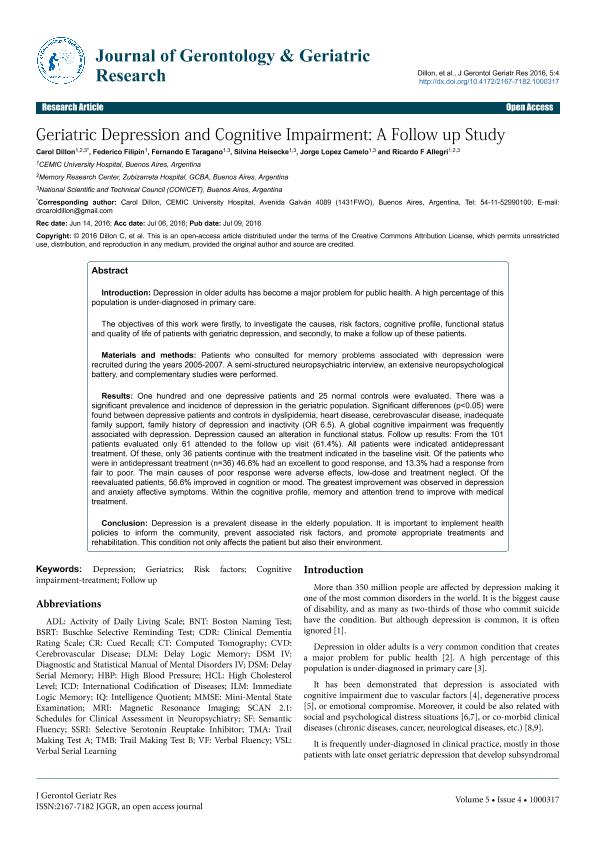Mostrar el registro sencillo del ítem
dc.contributor.author
Dillon, Carol

dc.contributor.author
Filipin, Federico
dc.contributor.author
Taragano, Fernando Emilio

dc.contributor.author
Heisecke Peralta, Silvina Lidia

dc.contributor.author
López Camelo, Jorge Santiago

dc.contributor.author
Allegri, Ricardo Francisco

dc.date.available
2020-09-14T15:33:22Z
dc.date.issued
2016-06
dc.identifier.citation
Dillon, Carol; Filipin, Federico; Taragano, Fernando Emilio; Heisecke Peralta, Silvina Lidia; López Camelo, Jorge Santiago; et al.; Geriatric Depression and Cognitive Impairment: A Follow up Study; Omics International; Journal of Gerontology & Geriatric Research; 5; 4; 6-2016; 317-325
dc.identifier.uri
http://hdl.handle.net/11336/113921
dc.description.abstract
Introduction: Depression in older adults has become a major problem for public health. A high percentage of this population is under-diagnosed in primary care. The objectives of this work were firstly, to investigate the causes, risk factors, cognitive profile, functional status and quality of life of patients with geriatric depression, and secondly, to make a follow up of these patients. Materials and methods: Patients who consulted for memory problems associated with depression were recruited during the years 2005-2007. A semi-structured neuropsychiatric interview, an extensive neuropsychological battery, and complementary studies were performed. Results: One hundred and one depressive patients and 25 normal controls were evaluated. There was a significant prevalence and incidence of depression in the geriatric population. Significant differences (p<0.05) were found between depressive patients and controls in dyslipidemia, heart disease, cerebrovascular disease, inadequate family support, family history of depression and inactivity (OR 6.5). A global cognitive impairment was frequently associated with depression. Depression caused an alteration in functional status. Follow up results: From the 101 patients evaluated only 61 attended to the follow up visit (61.4%). All patients were indicated antidepressant treatment. Of these, only 36 patients continue with the treatment indicated in the baseline visit. Of the patients who were in antidepressant treatment (n=36) 46.6% had an excellent to good response, and 13.3% had a response from fair to poor. The main causes of poor response were adverse effects, low-dose and treatment neglect. Of the reevaluated patients, 56.6% improved in cognition or mood. The greatest improvement was observed in depression and anxiety affective symptoms. Within the cognitive profile, memory and attention trend to improve with medical treatment. Conclusion: Depression is a prevalent disease in the elderly population. It is important to implement health policies to inform the community, prevent associated risk factors, and promote appropriate treatments and rehabilitation. This condition not only affects the patient but also their environment.
dc.format
application/pdf
dc.language.iso
eng
dc.publisher
Omics International
dc.rights
info:eu-repo/semantics/openAccess
dc.rights.uri
https://creativecommons.org/licenses/by-nc-sa/2.5/ar/
dc.subject
DEPRESSION
dc.subject
GERIATRICS
dc.subject
RISK FACTORS
dc.subject
COGNITIVE IMPAIRMENT
dc.subject.classification
Geriatría y Gerontología

dc.subject.classification
Medicina Clínica

dc.subject.classification
CIENCIAS MÉDICAS Y DE LA SALUD

dc.title
Geriatric Depression and Cognitive Impairment: A Follow up Study
dc.type
info:eu-repo/semantics/article
dc.type
info:ar-repo/semantics/artículo
dc.type
info:eu-repo/semantics/publishedVersion
dc.date.updated
2020-09-11T18:50:32Z
dc.identifier.eissn
2167-7182
dc.journal.volume
5
dc.journal.number
4
dc.journal.pagination
317-325
dc.journal.pais
Estados Unidos

dc.description.fil
Fil: Dillon, Carol. Centro de Educaciones Médicas e Investigación Clínica "Norberto Quirno"; Argentina. Gobierno de la Ciudad de Buenos Aires. Hospital "Dr. Abel Zubizarreta"; Argentina. Consejo Nacional de Investigaciones Científicas y Técnicas; Argentina
dc.description.fil
Fil: Filipin, Federico. Centro de Educaciones Médicas e Investigación Clínica "Norberto Quirno"; Argentina
dc.description.fil
Fil: Taragano, Fernando Emilio. Centro de Educaciones Médicas e Investigación Clínica "Norberto Quirno"; Argentina. Consejo Nacional de Investigaciones Científicas y Técnicas; Argentina
dc.description.fil
Fil: Heisecke Peralta, Silvina Lidia. Centro de Educaciones Médicas e Investigación Clínica "Norberto Quirno"; Argentina. Consejo Nacional de Investigaciones Científicas y Técnicas; Argentina
dc.description.fil
Fil: López Camelo, Jorge Santiago. Centro de Educaciones Médicas e Investigación Clínica "Norberto Quirno"; Argentina. Consejo Nacional de Investigaciones Científicas y Técnicas; Argentina
dc.description.fil
Fil: Allegri, Ricardo Francisco. Fundación para la Lucha contra las Enfermedades Neurológicas de la Infancia; Argentina. Gobierno de la Ciudad de Buenos Aires. Hospital "Dr. Abel Zubizarreta"; Argentina. Consejo Nacional de Investigaciones Científicas y Técnicas; Argentina
dc.journal.title
Journal of Gerontology & Geriatric Research
dc.relation.alternativeid
info:eu-repo/semantics/altIdentifier/doi/http://dx.doi.org/10.4172/2167-7182.1000317
dc.relation.alternativeid
info:eu-repo/semantics/altIdentifier/url/https://www.longdom.org/abstract/geriatric-depression-and-cognitive-impairment-a-follow-up-study-51033.html
Archivos asociados
